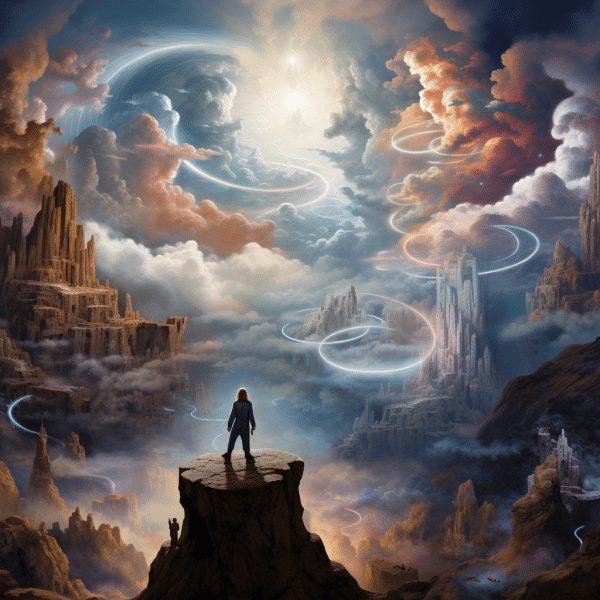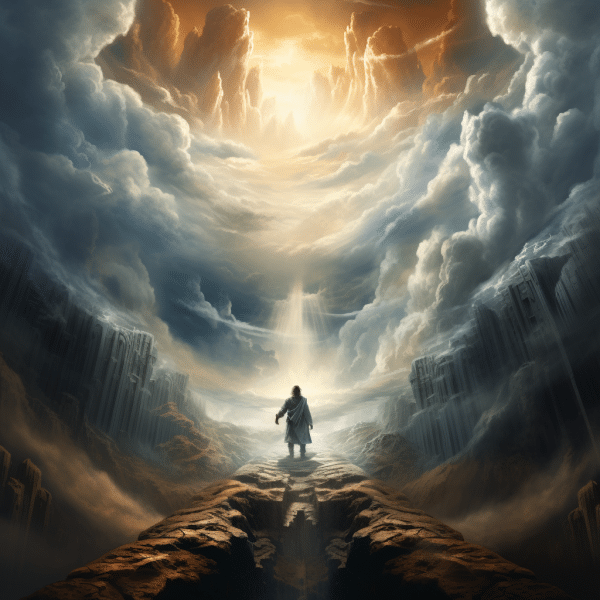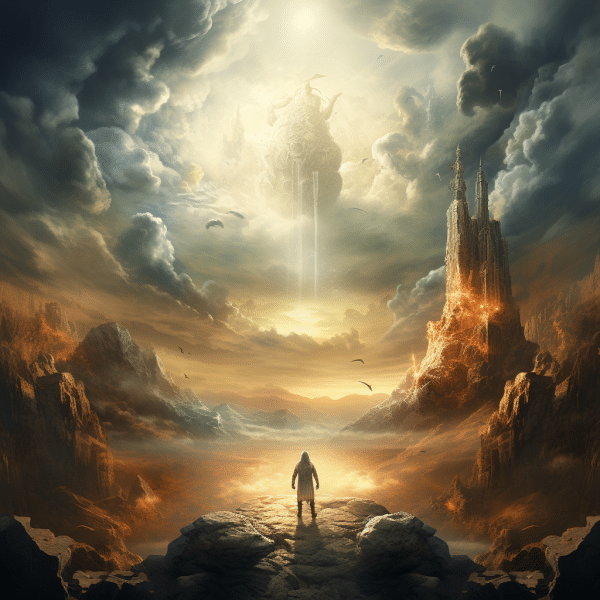

The concept of God presents us with a lot of interesting and perplexing Challenges of Defining God. From philosophical and theological debates to the complexities of faith and human understanding, exploring these difficulties requires deep thought about belief systems, nature, and existence.
We ask ourselves: Is God an all-powerful being controlling everything? How do we reconcile evil and suffering with a kind Creator? These questions test our understanding of the supernatural and make us think about faith and unusual events.
Every challenge is unique. For example, there’s the role of miracles in relation to God – are they divine interventions or normal events seen wrong?
These challenges are difficult, but there are ways to make progress. We can keep an open mind to different ideas and interpretations. Further, studying religious texts from different cultures expands our understanding of beliefs about God.
Lastly, taking part in philosophical discussions lets us think about abstract concepts related to divinity.
In conclusion, to understand the challenges posed by God, we need an open outlook and academic discipline. Through dialogue, research, and critical thinking, we can begin to unlock the mysteries of philosophical and theological aspects of God, and gain a greater insight into this subject.
Challenges of Defining God
Defining God is a daunting task that has challenged thinkers for centuries. It’s hard to summarize an entity believed to be infinitely complex and beyond human comprehension.
One reason is the diverse religious beliefs and cultural interpretations. Each presents its own notion of God, making it tough to find a definition that fits everyone.
Another is the transcendence attributed to God. Many traditions believe God is beyond time, space, and human understanding. Trying to define something outside our intellect is paradoxical.
Language is also a limitation. Words are limited and don’t have the capacity to express the infinite nature of divinity. Trying to contain God in language is hopeless.
Rumi, a famous Sufi mystic, exemplifies this. He grappled with expressing his spiritual experiences through poetry. He used metaphors and symbols instead, as language alone couldn’t capture his revelations.
The Problem of Evil
The Problem of Evil contains natural disasters, human suffering, and moral evil. Earthquakes, hurricanes, and tsunamis cause destruction, yet why does a benevolent God allow them? Humans suffer too, from violence to death, yet why does a loving God not intervene? Moral evil, with free will, means humans harm themselves and others – why would a compassionate God permit it?
Epicurus asked, “Is God willing to prevent evil but not able? Then he is impotent. Is he able but not willing? Then he is malevolent.” Philosophers and theologians throughout history have studied this complex issue, yet no answers are certain. Contemplating these mysteries can lead to greater understanding for life’s complexities.
The Paradox of Omnipotence and Free Will
God’s omnipotence and human free will are paradoxical. How can an all-powerful being exist with individual choice? This has puzzled theologians, philosophers, and thinkers.
Some say if God is really all-powerful, free will must be an illusion. Can we have real choices if He controls everything? But if humans have free will, it limits God’s power. Can He intervene without damaging our freedom?
This paradox tests our understanding of God and His power. It makes us think about determinism, predestination, and the start of evil. The combination of divine rule and human volition seems impossible, but it encourages us to research our beliefs.
In Greek mythology, Zeus and Prometheus present a similar quandary. Zeus was seen as the most powerful god over mortals. However, Prometheus disobeyed Zeus by giving fire to humans. This suggests human defiance of divine authority and raises questions of Gods’ control and human autonomy.
The Paradox of Omnipotence and Free Will is a mystery that makes us ponder divine power and human agency. It brings out the complexity of our concept of God and shows the limits of our understanding as mortals trying to solve spiritual puzzles.
Incomprehensibility of the Divine
The incomprehensibility of the divine is a perplexing concept. It defies human comprehension and intellectual grasp. Our finite minds cannot comprehend the infinite. This highlights the vastness and transcendence of God, pushing us towards humility.
We must accept that there are aspects of God that will forever remain beyond our grasp. This drives us to approach the divine with reverence and respect. We may seek answers but it is essential to maintain wonder and humility.
This serves as a reminder that God transcends human categorizations and definitions. Our language and conceptual frameworks cannot contain the boundless nature of God. This challenges us to go beyond rigid doctrines and explore diverse perspectives.
Numerous theologians and mystics have taken up the challenge. From Plato to Aquinas, individuals have sought to shed light on this enigma. Rich religious traditions are adorned with narratives illustrating encounters with the ineffable divine. These stories remind us that throughout history, people have been confronted with the incomprehensibility of the divine and have been called to deepen their faith and understanding.
The Role of Faith in Addressing and Overcoming Challenges
Faith is key in tackling life’s struggles. It gives us a sense of purpose and hope, so we can get through tough times. Here are three main points that show the power of faith:
- Strength: Faith builds our inner power during tough situations. It is a source of motivation and helps us keep going even when the challenge is big.
- Guidance: Believing gives us guidance from a higher power, through prayer or meditation. This helps us make decisions when things are uncertain.
- Support: Joining religious communities gives us a great support system. We get encouragement, advice and compassion from those who share our beliefs.
Faith also helps us stay positive, and be thankful for what we have, even when bad things happen. It makes us believe we can learn and grow from challenges.
Now is the time to have faith and not miss out on its benefits. We can find strength, guidance and support. Challenges of Defining God can be opportunities for growth, and faith can help us overcome them. Let’s make sure we don’t miss out on these blessings!

Conclusion
Comprehending God is a complex and daunting task. We have looked into different aspects of this, including the boundaries of human knowledge, the variety of religious beliefs, and the issue of evil in the world.
It is obvious that trying to understand something so infinite and complicated as God is not possible to do completely. Our human minds, restricted by time and space, make it impossible to grasp the full wisdom of a deity. Moreover, different religions offer diverse conceptions of God, consequently making things more Challenges of Defining God complicated.
Furthermore, the presence of evil is a major Challenges of Defining God when contemplating an all-powerful and perfect being. Unfairness and misery in the world prompt questions about God’s all-knowingness, omnipotence, and kindness. These paradoxes bring about intense thought and emotion.
Challenges of Defining God Nevertheless, even with these issues, it is necessary to keep examining and searching for a better understanding of God. By engaging in philosophical dialogues, studying religious scriptures, and embracing spiritual customs, we can try to increase our knowledge and relate to something larger than ourselves.
Frequently Asked Questions
Q: What are the challenges of God?
A: The concept of God as an omniscient and omnipotent being poses several challenges:
1. Problem of Evil: The existence of evil and suffering in the world raises questions about God’s goodness and omnipotence. If God is all-powerful and all-loving, why does evil exist?
2. Lack of Empirical Evidence: Many people question the existence of God due to the lack of empirical evidence. The challenge lies in providing tangible proof of God’s existence.
3. Divine Hiddenness: Some argue that God’s alleged existence is difficult to perceive or understand, raising questions about why God does not make himself more evident.
4. Logical Inconsistencies: Critics often point out logical inconsistencies in the concept of an all-powerful and all-knowing God. For example, the paradox of free will versus God’s divine plan.
5. Divine Attributes: Many find it challenging to reconcile the simultaneous existence of God’s attributes, such as omniscience, omnipotence, and omnibenevolence, given the presence of evil and suffering.
6. Diversity of Beliefs: The existence of various religious beliefs and interpretations of God’s nature raises questions about the true nature of God and challenges the notion of a singular divine being.








